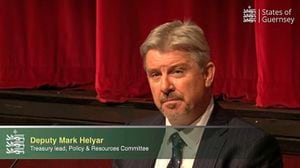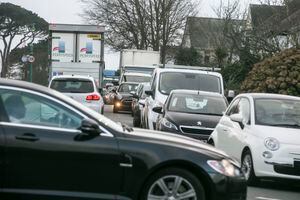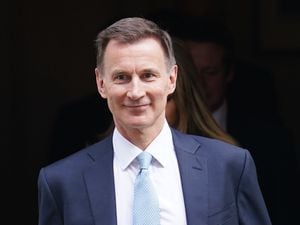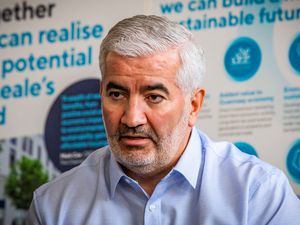Taxing times in managing Guernsey’s public finances
WHEN it comes to the state of public finances, Mark Helyar is crystal clear. The amount of money coming in will not be enough to cover what is set to go out in the not so distant future. Long-term government expenditure has been estimated at an additional £80-130m. per annum. The challenge is how to remedy the situation, not least as the island continues to deal with the cost of the Covid-19 pandemic.

‘We find ourselves in very difficult circumstances. I think it’s only fair to be realistic with the public and with our colleagues in government that we’re in challenging times,’ he says. ‘One of the options that we don’t have is hoping for the best. We definitely have to have to plan for conservative outcomes and make sure that we’re acting in a fiscally prudent way.
‘If that means having to put taxes up, it means having to put taxes up. What we really want to see is a combination of things. I prefer to see savings. I’d like to see efficiencies. I’d really prefer the economy to grow, so that we don’t have to do any of this. That would be the ideal thing.’
Multiple challenges
Deputy Helyar explains the tax take is currently around 30% when you include income tax and add it to social security. Add in the pressures of an ageing population, with care and pension costs, and no amount of ‘tinkering’ will fill a gap that is projected to run into tens of millions of pounds in the coming years.
‘We’re flagging it up early because it needs to be flagged up now. We’re not in any imminent danger of not being able to get through the next few years running a deficit. People shouldn’t necessarily worry about that,’ he continues. ‘But it’s only right to flag it up to those who are making decisions and spending decisions in particular that affect revenue that they need to be prudent.’
As part of that work a review will examine options to deal with the financial challenges, with P&R pledging to complete it in 2021.
The fiscal review
‘It won’t recommend tax rises. It will show members of the States what different types of approach to taxation will return,’ says Deputy Helyar.
It will look at how much would be returned by putting X percent on income or GST, for example. Other taxes such as road pricing instead of or in replacement of duty on fuel over time are also set to come under the microscope.
‘It will be an operational report, which deals with all the tools that can be used to increase taxation,’ adds the treasury lead.

‘But that isn’t the only tool for fixing the fiscal issues we have. In conjunction with that we have the opportunity to grow and diversify the economy. Relatively small amounts of growth in the economy can provide the equivalent of very large amounts in increases in taxation.
‘We have to be very clear in the fiscal review, that there are detrimental aspects to increasing tax – that it will stymie and stifle business and it will discourage it from coming if it gets to a rate which is too high.
‘So we have to make difficult choices about how competitive we remain, and particularly between other Crown dependencies and their tax regimes. There’s also an external aspect to it. We wouldn’t want to be seen increasing our basic tax rates in competition with Jersey or the other jurisdictions because it could well lose us business.’
He reveals that he has held discussions with counterparts in Jersey and the Isle of Man to this extent.
Pay-as-you-go driving?
With increasingly more efficient cars and a move to electric vehicles, the conversation returns to the future of fuel duty – and the prospect of it falling, leaving another gap in valuable funding for public services.
Deputy Helyar reiterates P&R has been tasked with investigating it. He also offers his personal view that road pricing would be ‘administratively burdensome for such a small jurisdiction and it’s intrusive, and that there are other solutions.

‘For example, insurance premium tax that you could use. If there is a tax imposed on insurers that are insuring motor vehicles and electric vehicles then everybody is paying. They’ll be paying according to the price that they pay for their insurance which directly relates to the size of the car and its expense.’
Savings
Another part of the mix is savings. ‘I can’t enforce spending cuts and neither can P&R on any other committee,’ he says. ‘But what we’ve been trying to say to members is that it really needs a very fine focus on expenditure across the whole of the States in every committee. Everybody has something, I’m sure, they can contribute towards that without necessarily harming frontline services.’
Tax breaks
The ambition is to increase the overall economy, offsetting more difficult options. Some targeted tax cuts or breaks could help, says Deputy Helyar. ‘We’re been talking with Economic Development, one of the things that’s been bandied about is tax breaks and social security breaks for new start-up businesses wanting to come to the island. The biggest part of the economy which generates taxes is people generating income tax through salaries and profits in their Guernsey-based companies,’ he adds.
‘You can use it as seed capital. The other thing is that we’ve been thinking about using the things that are free because they don’t cost us revenue or capital. Things like doing those breaks, they are free because you have still got people who are earning and paying tax. So indirectly they generate wealth for everybody.’





